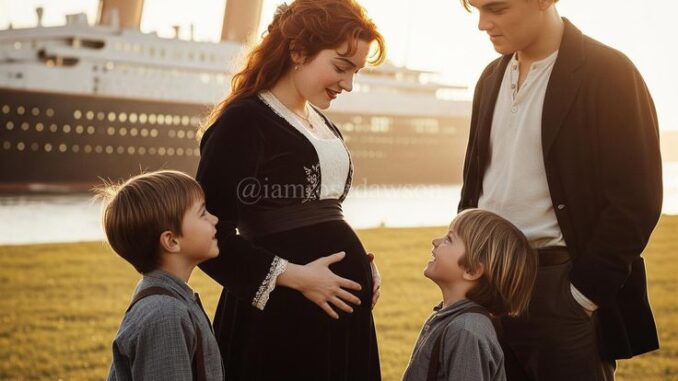
The Unsinkable Question: Kate Winslet Reflects on Titanic and the Enduring Mystery of the Door
Twenty-seven years have passed since the RMS Titanic sank on the silver screen, taking with it not just 1,500 fictional souls, but also the hopes of countless viewers for a different ending for Jack Dawson. The image of Rose DeWitt Bukater floating on a wooden panel, while her beloved Jack succumbs to the icy North Atlantic, remains one of cinema’s most enduring and heartbreakingly frustrating moments. And even after nearly three decades, the question persists: Could Rose have really saved Jack’s life?
This perennial debate has been reignited not by a scientific re-enactment or a new fan theory, but by Kate Winslet herself. The actress, who imbued Rose with such fiery spirit and vulnerability, recently revisited the infamous scene, weighing in with the wisdom of time and the unique perspective of someone who literally lived through it, albeit on a meticulously crafted set. Her reflections, tinged with a blend of humor, exhaustion, and a mature understanding of the film’s colossal legacy, offer a fresh lens through which to examine a question that has transcended mere movie trivia to become a cultural touchstone.
For years, the internet has buzzed with diagrams, calculations, and even Mythbusters episodes dedicated to proving that the door – or rather, the piece of ornate wall paneling – was indeed large enough for two. Fans, driven by a profound emotional investment in Jack and Rose’s whirlwind romance, have desperately wished for a different outcome, meticulously analyzing buoyancy, weight distribution, and the physics of frigid water. James Cameron, the film’s director, has repeatedly shut down these arguments, citing narrative necessity and the undeniable fact that had Jack survived, the story of Rose’s independence and her life lived “to the fullest” in his memory would have been fundamentally altered, perhaps even diminished.
Kate Winslet’s recent comments, however, cut through the scientific speculation and directorial intent with a human touch. She’s acknowledged the exhaustion of playing the role, the sheer physical toll of being submerged in freezing water for hours on end, and the desperate vulnerability of the characters. Her insights don’t seek to rewrite the script but rather to offer a lived-in perspective. While she has conceded that the panel was likely big enough in principle, her reflections often point to the raw, visceral reality of the situation within the film’s narrative. Two hypothermic, waterlogged individuals clinging to a single, bobbing piece of debris in the pitch black of the North Atlantic – it’s a far cry from a controlled laboratory experiment. Her retrospective weariness speaks volumes: even if physically possible, the chances of both surviving, given their compromised state and the extreme conditions, would have been astronomically slim. She’s not just an actress; she’s the character, and her memory of the ordeal grounds the fantastical “what if” in a harsh reality.
Beyond the practicalities, Winslet’s reflections subtly underscore the narrative imperative behind Jack’s death. As an actor intimately connected to the character of Rose, she understands that Jack’s sacrifice isn’t merely a plot device; it’s the crucible through which Rose is forged. His death imbues her survival with purpose, making her a vessel for his dreams and a living testament to their love. Had he lived, the poignant “promise me you’ll never let go… and never let go of that promise” would lose its heartbreaking weight. Rose’s subsequent journey—her emigration, her pursuit of a fulfilling life, her raising children—would be just a love story, not the epic tale of remembrance and resilience it became. Jack’s icy grave allows Rose to truly blossom, unfettered by societal expectations, living a life that honored his memory and their brief, incandescent connection.
Twenty-seven years on, the “door debate” is less about physics and more about the enduring power of storytelling. Kate Winslet’s reflections serve as a reminder that Titanic isn’t just a historical drama or a romance; it’s a modern myth. And like all good myths, it invites endless reinterpretation, speculation, and emotional engagement. The enduring question of Jack’s survival is a testament to the film’s immersion, its ability to make us care so deeply about its characters that we yearn to rewrite their destiny. Winslet, as the heart of Rose, grounds this debate in both a weary realism and a profound appreciation for the narrative’s genius. She knows, perhaps better than anyone, that while the door might have fit two, the story absolutely needed only one. And in that poignant, illustrative truth, the legacy of Jack and Rose remains unsinkable.